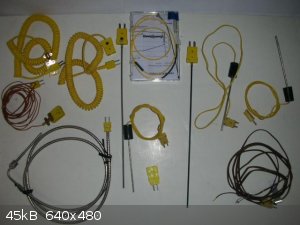
cogburnd02 - 24-4-2019 at 06:51
Let's say I want to measure the temp of some boiling sulfuric acid (for distillation.) What's the difference between something like this and something like this or this? why are the more expensive ones so much more expensive? Just because they're stick-shaped? Is that last one type-k or how can I find out?
Ubya - 24-4-2019 at 07:16
you can find out by asking the seller, this way you can be sure 100%.
for the reason why the last two probes are much more expensive than the first, look at how different they are. the cheaper one has just a blob of ptfe
on the thermocouple junction, the cables are not ptfe, so this probe has just a little advantage over a naked probe (corrosive fluids can still creep
between the ptfe and the plastic insulation of the wires). the expensive probes are fully encased in ptfe, so you could submerge 10cm of it in a
corrosive environment without any problems.
a naked probe costs 1 dollar, naked probe but with a blob of ptfe just on the tip 10 dollars, fully encased "stick" 80 dollars, always a tenfold in
price
cogburnd02 - 24-4-2019 at 07:41
Thanks. I thought the wires & stuff were ptfe coated. Also, I sincerely did not think of asking the seller. I feel like an idiot. Clearly I didn't
get enough sleep last night. Again, thank you.
kulep - 24-4-2019 at 08:19
Isn't a glass tube sealed in one end suitable for what you need? Just put the thermocouple inside with some packing material, you can also use an all
glass thermometer adapter instead so no leaks
Dr.Bob - 28-4-2019 at 18:24
A glass thermocouple well is what you describe, but they are quite expensive (if well made with glass joints), and they are fragile as can be. Glass
thermometers are also great, but again fragile. I have a few stick type thermocouples in a variety of types, lengths, and end plugs, some are PTFE
coated, and those are full encased. I posted a photo of some a while back.

